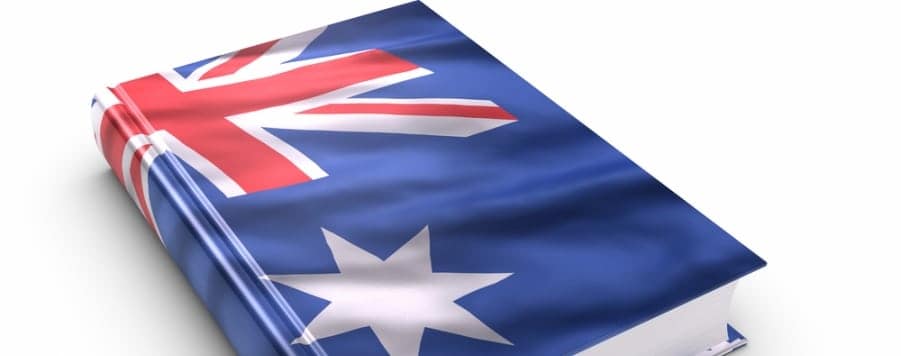Oxford Dictionaries today announced the largest ever quarterly update of Australian English on OxfordDictionaries.com, with over 500 new entries added to the free online dictionary of English.
This update is part of a collaborative project with the Australian National Dictionary Centre (ANDC) to increase Oxford Dictionaries’ online coverage of international varieties of English, making these words freely available online for the first time with fully updated definitions, pronunciations, and usage examples.
New entries include uniquely or chiefly Australian vocabulary such as lamington drive, lolly water, and mugaccino; typical abbreviations such as mushie, ocky, and plonko; and words from Aboriginal languages such as maluka, makarrata, and wonguim. Many of the new additions are also used in New Zealand English.
The online format eliminates the difficulties lexicographers have previously faced, providing unlimited space for dictionary entries reflecting established vocabulary and language developments around the world.
Judy Pearsall, Editorial Director for Oxford Dictionaries, explains the rationale behind the update: “English is truly a global language, with many different varieties and nuances based on the local culture and life. At OxfordDictionaries.com our goal is to bring the vocabulary of English from all parts of the world to our users, wherever they are.
“Australian English has an amazingly rich seam of vocabulary, and in this latest update we have boosted the coverage by adding more than 500 Australianisms, both recent and past coinages, with words from subjects as wide-ranging as business and education, sport and leisure, farming, food and drink, the weather, and the landscape. The Australian sense of humour is conveyed by colourful colloquialisms and slang terms such as shirtfront and rubbity-dub, while there are also key historical terms (loan gang and lurkman), terms from Aboriginal languages (maluka and monjon), and technical vocabulary. By doing all of this, OxfordDictionaries.com presents a fascinating picture of Australia’s unique culture, history, and language.”
Words unique to Australian English
All varieties and dialects of English have their own words for everyday things, many of which are rarely, if ever, used elsewhere. Australian English is no exception – most people outside of Australasia would struggle to know the meaning of many words added to OxfordDictionaries.com today, including lamington drive (an organized effort to raise money for charity from the sale of lamingtons), sausage sizzle (a chiefly Australian term for a fundraising or social event at which barbecued sausages served on a slice of bread are sold or provided), lolly pink (a vibrant shade of pink), lolly water (a non-alcoholic or weak alcoholic drink), little lunch or play lunch (a mid-morning break at school, during which children have light refreshments), mugaccino (a cappuccino coffee served in a mug), phrase off the grog (abstaining from drinking alcohol), pilchers (a waterproof cover worn over a baby’s nappy), phrase rough as guts (lacking in refinement or sophistication), phrase sell off the farm (sell the capital assets of a country to foreign interests), and wombat crossing (a pedestrian crossing in the form of a wide, flat speed bump).
Also see: ‘Bogan’ breaks into Oxford dictionary
Words from Aboriginal languages
The words in this update also recognise the complex role of Aboriginal language in Australian English, which dates back to 1770 when Captain James Cook and Joseph Banks recorded the word kangaroo from an Aboriginal language of north-eastern Australia. The dictionary update shows that borrowing from Aboriginal languages is a continuing process, with more words being recognised as having their origin in Aboriginal languages, and other words moving from Aboriginal languages into mainstream Australian English. Maluka (the person in charge; the boss) is derived from the Aboriginal language Djingulu, for instance, and has moved into general use; similarly, the word munjon (an Aboriginal person who has had little contact with white society) was borrowed in the 1930s from Yindjibarndi.
Australasian abbreviations and diminutives
Today’s additions to OxfordDictionaries.com reflect how Australians and New Zealanders use more abbreviations and diminutive words than any other English speakers. New entries for words with an –ie or –y suffix include littley (a young child), mushie (a mushroom), ocky (an octopus), saltie (a saltwater crocodile), scratchie (a scratch card), shornie (a newly shorn sheep), trammie (a tram driver or conductor), wettie (a wetsuit), and youngie (a young person). The –o suffix also appears frequently, in words such as milko (a milkman), Nasho (a person undergoing compulsory military training as introduced under the National Service Act), plonko (an alcoholic), and sarvo (this afternoon).
Shortening words, and using endings such as –o and –ie or –y, makes the speaker appear more relaxed and friendly, so by using this informal style people are often signalling their lack of pretentiousness, as well as making themselves seem open and approachable.
What is Australian English?
The Australian National Dictionary Centre provides Oxford University Press with editorial expertise for its Australian dictionaries.
Mark Gwynn, editor at the ANDC, said of the update: “Australian English is a distinctive variety of global English. The influence of Aboriginal culture and language; the early penal settlement established in the late 18th century; the influence of regional dialects brought by early settlers from the UK; the distinct and diverse range of fauna, flora, and geographical features: all of these factors have shaped a distinctive Australian English vocabulary. Australian English is often noted for its informality, colloquialisms, and the way this is seen to reflect a particular Australian sense of humour and disdain for authority, but Australian English is more than this – it reflects the diverse nature of Australian society and Australian experiences, and this can be seen in microcosm in the entries added to OxfordDictionaries.com today.”
What’s the difference between OxfordDictionaries.com and the Oxford English Dictionary (OED)?
The new entries mentioned above have been added to OxfordDictionaries.com, not the OED. The English language dictionary content on OxfordDictionaries.com focuses on current English and includes modern meanings of words and associated usage examples. The OED, on the other hand, is a historical dictionary and forms a record of all the core words and meanings in English over more than 1,000 years, from Old English to the present day, including many obsolete and historical terms.












